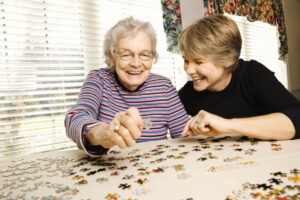Individuals with Alzheimer’s and other forms of dementia sometimes have trouble sleeping, or they sleep on irregular schedules. The reasons for such sleep disturbances are unclear, but medical experts say there are strategies that can help.
March 11 kicks off the annual Sleep Awareness Week — sponsored by the National Sleep Foundation — to educate the public on the importance of sleep for overall well-being. At any age, sleep continues to play a vital role in health.
How do sleep disorders affect people with dementia, and what can care partners do to help promote a good night’s rest?
Changes in Sleeping Patterns
Contrary to common belief, older adults need just as much sleep as younger adults, although the specific number of required hours varies among individuals. However, many older adults do not get enough sleep, and the effects of dementia can exacerbate the problem.
Sleep disturbances occur frequently among individuals with Alzheimer’s and dementia, and care partners also suffer in many cases. Sleep problems such as night wandering are cited as common reasons for seeking additional care for people with dementia.
In addition, people with dementia often have trouble getting to sleep and staying asleep; studies of brain waves indicate reduction of dreaming and non-dreaming phases of sleep. When individuals with dementia are unable to sleep, they are more likely to wander or otherwise disrupt sleep for their care partners as well.
People with dementia also may fall asleep during the day, although they have trouble sleeping at night. In the late stages of Alzheimer’s, people may be awake for as much as 40 percent of the night even as they remain drowsy in the daytime.
Treating Sleep Disorders
If you are a care partner for an individual with dementia who experiences sleep disturbances, seeing a medical professional is a vital first step toward effective treatment. An experienced doctor can help identify any underlying medical problems that can worsen sleep disorders. For example, restless leg syndrome, sleep apnea and depression all can increase the severity of sleep problems.
For sleep problems that are directly related to Alzheimer’s or another form of dementia, your doctor may recommend treatment approaches both with and without medications. If a medical professional does recommend a medication, make sure you understand any possible side effects, including drowsiness that can increase the chance of falls.
A variety of non-drug approaches also can help with management of sleep problems. For example, keeping to a schedule for mealtimes and bedtimes can help, along with ensuring that the individual with dementia gets exposure to sunlight in the mornings. Discourage the use of stimulating substances such as nicotine, alcohol and caffeine, and keep the bedroom temperature comfortable for sleeping.
At every age, getting enough sleep is vital for physical and emotional well-being. If you care for someone with dementia who experiences sleep problems, incorporate good sleep hygiene practices into your routine, and see a medical professional for personalized treatment.




















